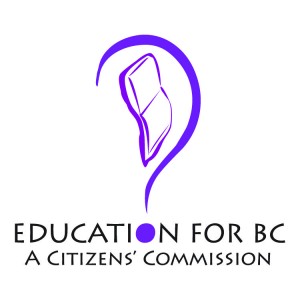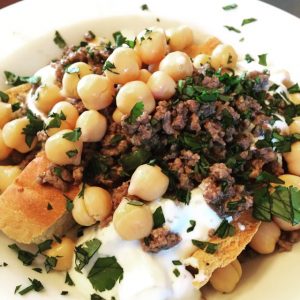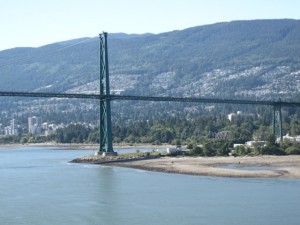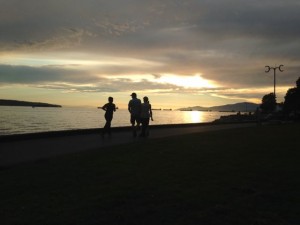Education
An “Old Country” Family Favourite
Three days ago, I posted a photo of what I’d made for dinner on social media. It received likes, hearts, compliments, and requests for the recipe.
I’m pleased to share that recipe with you now albeit with hesitation.
Why?
Because I learned to cook from my mother and my grandmother and they didn’t use recipes!
And while I always use recipes for baking and sometimes for savoury dishes, my version of cooking is a little bit of this and a little bit of that and I wonder what this would taste like if I added that.
So take this more as a guideline for preparing Fateh al Laban (laban is the Arabic word for yogurt). Make the dish your own by experimenting with the proportions and the seasoning. There’s a vegetarian option, too, that Mom developed. I’ll describe that alternative after I’ve given you the details for preparing the traditional dish.
There are six components to Fateh: croutons, chickpeas, pine nuts, ground beef, yogurt, and herb garnish. I find it easiest to serve the components separately. Each diner can then assemble a plate according to their likes and dislikes. That also means the leftovers keep better than if they’ve been mixed together.
Croutons
Take two loaves of pita bread. Separate the halves of each loaf and tear them up into bite-sized pieces. Spread on a baking sheet covered with parchment paper and cook in a 350˚ oven until golden brown. Remove and set aside. Regular croutons will work but then you’ll miss out on the Lebanese look!
Chickpeas
Open a small can of chickpeas. Drain and rinse the chickpeas. Let them sit in a colander to dry until you’re ready to serve.
Pine Nuts
Fry a handful of pine nuts in butter until golden. Remove and set aside. Alternatively, mix them with a touch of olive oil and bake in a 350˚ oven until golden brown. Pine nuts burn easily, so check on them frequently if you have them in the oven. If you’re frying the pine nuts, turn off the heat just as the pine nuts begin to brown.
Ground Beef
I typically use .5 kilogram (1 pound) of lean or extra lean ground beef for two and that leaves a lot for leftovers. Fry the ground beef in a pan until cooked through. Season with salt, pepper, and allspice (no more than 15 ml, 1 teaspoon, of the latter). You can also add chopped jalapeño and a few drops of Worcestershire Sauce. Drain and keep at room temperature. As I’m writing this out, I realize that it would also work to mix the pine nuts in with the beef. I might try that next time.
Yogurt
Use approximately 250 ml (1 cup) of plain yogurt. It doesn’t matter which brand you choose or whether the yogurt is skim, 2%, or whole. I’d recommend the 2% or whole — just make sure it’s plain and not French Vanilla! In a mortar, crush 1/2-1 clove of garlic with salt, pepper, and a few, washed, shredded fresh mint leaves. Add the spiced garlic paste to the yogurt and mix thoroughly. You can also mix in diced cucumber to the yogurt mixture for an extra bite.
Garnish
Finely chop a green herb to use as garnish. I use cilantro because L. likes the flavour; parsley is the traditional option. You could also use mint or a combination of any or all three.
And that’s it. Seriously. Those are the components and once they’re ready to go, layer them in a bowl and dig in! I prefer to put the croutons on top rather than using them as a base so that they stay crunchy. If you place them under the yogurt, they get soggy pretty quickly.
Vegetarian Option
- Substitute boiled pasta — rotini or penne works best — for the croutons.
- Substitute broiled eggplant slices for the ground beef.
- Leave out the chickpeas.
- Mix all ingredients together to serve and garnish with chopped herbs.
Sahtain — bon appétit in Arabic — and let me know how your version of this dish works out.
For me, this dish is one of my comfort foods and L. loves it, too.
As with so many things, to share this dish with you is to share memories of Mom and to honour her legacy. Thanks for requesting the recipe.
The Balance In Governance
As parents and educators, we know there’s a balance when working with those who may depend upon us. We want to be their friends, but that’s not our only role. There is a boundary — the hardest one to find — between being a friend and being an effective role model and guide.
The same is true with Boards and governance. It’s not necessarily about being liked, it’s about being effective.
While my most recent experience is as a Trustee with the West Vancouver Board of Education, my comments are applicable to Boards in general. I also don’t claim to have answers nor have I conducted exhaustive research; these are personal reflections.
It may be important for Boards and the senior teams they work with to have their goals and objectives align, but this doesn’t always mean their interests are the same. So while mutual support and consideration are essential ingredients for long-term success, there has to be an acknowledgement that consensus is not the same as agreement. Opposition and conflict are not always signs of dysfunction and elements of both can lead to better decision-making because conformity and complacency, in my opinion, are greater dangers.
A quick Google search turned up this provocative article from the Harvard Business Review which points to weaknesses in our notions about teams and stresses the importance of asking questions. I always find it perplexing that we stress the importance of critical thinking skills in twenty-first century learning and yet have trouble with the actual application of such skills in the workplace. To me, a successful Board is one which makes its safe for questions to be asked (easy questions, tough questions, ridiculous questions, any kind of question) because that is a Board which values knowing over guessing, inquiry over a lack of curiousity, and due diligence over acceptance.
Perhaps the most challenging part of being on any Board today is the way in which information circulates. Correspondence is rarely two ways — it’s multi-directional — and the speed at which we communicate has accelerated. It’s so important to get a good grasp on how communications and correspondence will be managed, but it’s also critical, in my opinion, to recognize that managing the process of being responsive is not about shutting down voices. It then becomes an issue of how to set up an effective system which is timely, efficient, and allows for diversity in who speaks on what and when. The tendency, as we can see in federal and provincial politics, is to centralize the message and if you’re like me, you can see that it works, but at a cost to democratic representation.
Boards also need to know more than what they are told they need to know. As is true in education, it’s not about spoon feeding content, but about engagement and broadening horizons. It’s also important to remember who makes up a Board’s constituency. In a complex field such as education for example, it’s not just about the Trustees around the table nor the team in the School Board office nor the administration group in a school, it’s about all of these and it’s also about parents, students, employees, teachers, the community, and more.
It’s not easy being on a Board just as it’s not easy being a parent or an educator. And it’s never about finding the easy way of doing things.
It’s about recognizing boundaries and making sure they never turn into un-traversable moats.
With Labour Peace And A Four-Year Horizon
The results may be unofficial, but they are in.
My congratulations to Carolyn Broady, Dave Stevenson, Nicole Brown, Sheelah Donahue, and Pieter Dorsman: the newly elected West Vancouver Board of Education.
With a new mandate of four years and with the campaign behind them, this group of Trustees can now focus on the key priority which is to ensure that our public education system in West Vancouver continues to be one of the best, not only in British Columbia but across Canada.
We are so fortunate in West Vancouver. Not to deny that we too have vulnerable populations and significant needs here, but we are an economically affluent community and one which benefits from the support offered by parents, residents, and businesses. As I’ve often said, it’s not a surprise that we have a graduation rate of 99% in West Vancouver; anything less would be a scandal.
As a school district, we also have an accomplished team of leaders and educators working on behalf of our students and our community — a team recognized for their innovative practices as well as their commitment to excellence. Their efforts are matched by the hard work and diligence of all the district’s employees.
And yet I’m apprehensive.
Because there are pressures on the public education system from which even West Vancouver will not be immune.
The most significant pressure which this Board will face, as with all Boards across the province, is the issue of funding. While West Vancouver has been able to develop other sources of revenue, whether via academies, specialized programs, or international student enrolment, the amount raised may keep annual deficits at bay, but it does not fix the structural deficit upon which our system is based. There are cracks in the foundation.
There’s also a question in my mind as to what the provincial government’s intent may be with regard to both the governance structure and the bargaining structure. I’m worried about consultations which may appear to be based on consensus and which in fact are not.
With the election of a new Board and with one more public Board meeting to attend, I will be entering a new phase. I will now be a former Trustee, but that won’t make me any less committed to the cause of public education, whether in West Vancouver or throughout British Columbia. I will continue to play a part as an interested observer and passionate parent-advocate. To find out more about my plans, please check out EducationForBC.com and the information posted there.
With regard to School District 45, my top three issues for the new Board, in addition to continued advocacy at the provincial level, are: (1) to build and enhance relationships within the district; (2) to ensure the continued prominence of the arts and humanities in all our schools while exploring and expanding new opportunities for students; and, (3) to work towards smaller class sizes as well as enhanced support for students including advanced learners, children with special needs, and English Language Learners.
With a longer mandate and labour contracts in effect until 2019, there’s time and stability within the public education system for this Board to do its very best.
I’m counting on them as are all the members of our community, all our education partner groups, and, most importantly, all our students.
My appreciation to all the candidates who so generously and graciously put their names forward for consideration and my congratulations again to each of the newly elected and re-elected Trustees. Thank you in advance for your diligence, your hard work, and your passionate commitment to public education in West Vancouver.
An Announcement in Two Parts – Part 2: Let The Talks Begin
I want to talk to everyone.
I want to talk to parents, students, teachers, administrators, Trustees, business leaders, politicians, school district employees, community residents, the media, and more.
I want to talk to people in the Lower Mainland, throughout British Columbia, across Canada, and internationally. And I want to share the content of these discussions with others.
I want these conversations to be about education. Specifically, I want to discuss and investigate the following three key questions:
- What is education?
- What is the purpose of education?
- How do we deliver this education to all the children of BC to ensure the future health and vibrancy of our society?
I also want to make sure that education is a ballot box issue in 2017. I want the moderator of the next leaders’ debate to pose more than one throwaway question on the topic and I want every MLA candidate in this province to be asked about education when they are campaigning.
Why?

Because the current polarization in the education sector is not productive. The discussions about education in this province have devolved into ideologically formed positions and institutional battles with the result that we are not serving our children well.
The last Royal Commission on Education was held in 1988 and the world has changed since then, but these changes are not reflected enough within our education system.
During the recent job action, the BC Education Plan, a framework for planning proposed under the direction of the Ministry of Education, was politicized and the partisanship compromised the plan as an avenue for wide-ranging conversations.
I appreciate efforts such as BCEdChat on Twitter (Sunday evenings at 7:00 p.m. @bcedchat), the Ministry-led discussions around the curriculum, and many other individual initiatives meant to raise awareness of education issues. I also recognize the hard work of many other groups which have recently emerged to support public education. I hope they’ll all continue with the important work they’re doing. The more voices raised, the more they’re likely to be heard.
I also respect the work of the established groups which represent a collective voice for parents (BC Confederation of Parent Advisory Councils, BCCPAC), educators (BC Teachers’ Federation, BCTF), trustees (BC School Trustees Association, BCSTA), and others. Each organization has their own issues to address and I think they all have much to do in the future to meet the needs of their members.
Even so, it seems to me that we need to draw on a much wider circle of participation.
And that’s what I plan to do.
I want to create a forum and an arena where everyone can contribute to the discussion without having to be a member of any particular organization or having to espouse a particular outlook or perspective.
I want this to be a dialogue for all of us because the way in which we manage education affects each of us.
With this in mind, I’ve established a citizen’s commission on education. It’s a small step. One I felt I had to take because the “bigger picture” discussion about education has been lost in the turbulence of the sector over the past few decades.
This idea may work. It may not work. But I felt I had to do something to galvanize public attention and to give education in this province the attention and support it requires.
It’s time to focus the dialogue on education: what we mean by that term and what we want it to be. Then we need to let our political representatives know what it is we want from our education system. We can no longer sit back and have them tell us what education should look like because based on the evidence, their views do not seem to extend beyond the next election.
Join me in the conversation. Help me create a framework for dialogue. Visit www.EducationForBC.com and follow @edu4bc on Twitter. Help me get the talking started.
Let’s work together. Let’s make this happen for our children and for all of us.
An Announcement in Two Parts – Part 1: Not This Time
Three years ago, I put my name forward as a candidate in the 2011 municipal elections. I ran for the position of Trustee on the West Vancouver Board of Education and was honoured when voters in this community elected me to serve in that capacity.
My foray into electioneering also marked my social media debut outside the comfort zone of Facebook.
I dove into Twitter, a platform with which I’ve become very comfortable and which is now a part of how I absorb, consume, and contribute to media on a daily basis. It has also allowed me to create an invaluable network of connections.
After a long time of saying, “I would like to start a blog,” the election also spurred me to start one which I called The Comfort of Why. The best explanation for this title can be found in the speech I made at the first all-candidates’ meeting in 2011 where I said:
I take great comfort in the question why. As long as I’m asking why, I’m thinking, I’m reflecting, I’m challenging. I am looking for answers rather than assuming I have all the answers. I’m seeking information rather than dictating the way that things ought to be perceived.
To me, this questioning is not about undermining a system and disregarding the work that’s been done. It’s about validating what you believe, being responsive and strategic — making changes when they’re needed, when they’re necessary, and making them at the right time.
My first blog entry was posted on October 19, 2011, and it was comprised almost entirely of questions including this one:
Consider, too, that the BC Ministry of Education is pushing the concept of “personalized learning in the 21st century”. Why? What does it mean?
My position at the time, in regard to this particular question, was as follows:
Well, I want to be at the table to make sure that if there’s an overhaul of the system it’s done well and it’s done right. That it’s implemented in a way which benefits all students.
After three years of being at the table, I still feel this is a valid question and one that is not being addressed at a provincial level.
I still want to have this conversation. In fact, I feel we must have this conversation if we are to continue to offer our children the best opportunities to learn, to grow, and to find their way in the world.
While I recognize the valuable work that our Board has done in the past three years, in collaboration with the District Leadership Team, our education partners, our educators, and all our employees, I will not be seeking reelection in 2014.
Why?
There are a number of factors, but let me focus on three key points.
First, West Vancouver is a community with such depth of talent and with many actively engaged residents who are passionate about education. The deadline for nominations is tomorrow and already seven candidates have filed their papers which means we will have a dynamic and substantive campaign featuring a diverse range of opinions from individuals who all have much to offer.
Second, the most recent job action was very instructive and there are many lessons to be learned in how it played out. One of the most significant learning outcomes for me was to recognize that in order to move the provincial government into action on education, we need much greater direct engagement from the public. That citizens’ voice has to be galvanized if we want to ensure that education is a prominent, if not THE, election issue in 2017.
Finally, education in British Columbia has become such a polarized — and polarizing issue — that what we don’t talk about is education. This discussion — the conversation I’ve always said I wanted to see happen — has been drowned out by criticisms and accusations, by duelling press conferences and media soundbites, by job actions and political posturing.
It’s time that we, as citizens and voters, speak up and get what we want for our children, our society, and our future.
I have some ideas on how we might do just that.
Watch for Part 2.



